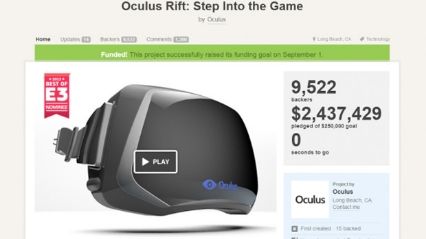Oculus VR – the company which begged raised about two and a half million dollars for its Oculus Rift headset via Kickstarter – is being sold to Facebook for a Bondvillaintastic two billion dollars (that figure includes shares). Facebook and Oculus VR are very happy about this; the rest of the internet, less so.
Take a look at the comments section of the Kickstarter page, for example. Though a few positive reactions to the sale of the headset “Designed for gamers, by gamers” have started to trickle through, the vast majority are from backers who are clearly angry about the deal, and would not have put their money forward had they known this was a possibility. The main grievances seem to be regarding Facebook’s monopoly on ideas and tech, the potential for Facebook to stifle creativity and inertia in Oculus development, and the fear of advertising flooding Oculus VR software. That is quite aside from the fact that Kickstarter is often perceived (rightly or wrongly) as a place where projects with no interest in corporate buyouts come for a helping hand.
The rights of Kickstarter backers have always been, and remain, a murky area. It is almost impossible to recover money paid once a project succeeds, and backers have no rights or entitlements beyond promised rewards for whichever tier their payment related to. In the case of Oculus VR, although Rift backers are theoretically investors, not a single person is entitled to a cent from the two billion dollar buyout. Ultimately, Facebook and Oculus VR probably don’t give a monkey’s uncle about the Kickstarter backers and their opinions (despite what they will doubtless say in the coming days). What will worry them, however, is the negative reaction from an indeterminate number of developers.

The exciting future of virtual reality.
It’s possible – likely, it could be convincingly argued – that it was Oculus VR’s plan from the beginning to be acquired by Facebook, or a similarly rich and powerful company. It is not currently clear, for example, who approached who regarding this deal; and besides, Oculus VR themselves needed to agree to the sale. Either way, it isn’t hard to imagine that both companies were well aware of the possibility of a violent backlash from Kickstarter backers. While not necessarily welcome, such a reaction will probably have a minimal effect on the long-term business plan. What they may not have anticipated is the negativity spreading to the development community. While it’s too early to say what impact the Facebook sale will have on interest in Oculus Rift development, within hours Notch very publicly declared that plans to bring Minecraft to the platform had been cancelled. Considering the fact that Minecraft is one of the most successful games on the planet, that’s quite a blow. It could also, potentially, lend courage to lesser known studios to follow suit.
All of a sudden Sony’s Project Morpheus announcement looks much more appealing for consumers and developers alike, and unintentionally well timed. One thing’s for sure; many more videogame-related Kickstarter projects will be treated with suspicion from now on.








It seems Sony are having a lot of luck riding the internet waves of hatred and back-lash from other people/companies making really dumb decisions right now. What happened with Rift was pretty disgusting in my opinion, but then I can’t blame Lucky (is there an E in there?) either; if you’d offered me a billion pounds when I was in my 20’s I’d probably sell you my granny too.
I’ve been waiting for proper in-the-home VR since The Lawnmower Man scientifically prove you could make an idiot a God with it in the 90’s. I may not have invested but I was saddened to see such an amazing concept sold to the suits. My main interest would obviously be its application to games but it’s obvious how much power this tech holds, and now it’s in the hands of the worst butchers in this industry. Ahh well, at least Sony has its own tech to play with. Let’s see where they go with it…